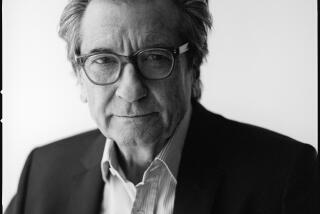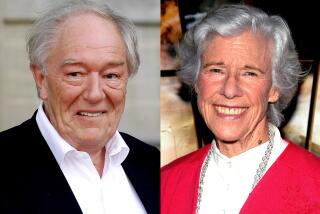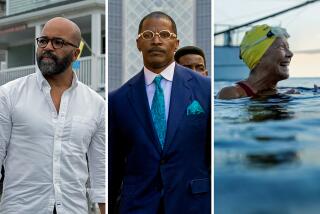MOVIE REVIEW : Huston’s Graceful Farewell Stirs Emotions in ‘The Dead’
John Huston had plans to make “The Dead” (opening Friday at the AMC 14, Century City) for at least five years before he did, but seeing now what he has drawn from it, the novella must have been in his mind a long while.
Those who worried about James Joyce’s classic should relax. Huston’s presentation of the story, a work which flows like music to its great and enveloping close, is impeccable. In a way, it’s the director’s gift back to Ireland, which he so loved. It was also a chance to work again with his daughter, Anjelica, and with his elder son, Tony, who adapted the screenplay.
Now it has become an exquisite grace note with which to close Huston’s own career.
For those who don’t know the story and may shy away from it from the somber title, the shock is the wit and the liveliness of the film and the exquisite savor of the lingo--Joyce’s own, discreetly extended when needed.
As the elderly Morkan sisters’ Dublin town house begins to fill with guests for their annual post-Christmas party--actually the Feast of the Epiphany, Jan. 6--the talk has a true Irish lilt. It should. These actors have been the noble backbone of Irish and British theater for decades.
Plump, cheery Kate Morkan (Helena Carroll) is worried that one of the guests, so memorably stewed last year, will be drunk again this year. Her sister, Julia (Cathleen Delany), frail and forgetful, remembers the disaster but rather more vaguely.
Soon the house fills up with guests of all ages, many of them piano students of the Morkans’ niece, Mary Jane (Ingrid Craigie), in her mid-30s but with the certainty that she will never marry plainly upon her. Waltzes, lancers, quadrilles take place in the parlor. Indeed the whole film seems to have the gently moving rhythms of the waltzes.
The film’s central couple arrive, Gabriel and Gretta Conroy (Donal McCann and Anjelica Huston). Gabriel, in his mid-40s, is the Morkans’ favorite nephew--a teacher with literary pretensions, including reviewing books for an English publication. Gretta, who’s from Galway, in the west of Ireland, and is presumably less cultured than her husband, is still gently able to tease his affectations, which currently include galoshes--rubbery “gutta-percha” things which Gabriel says “everyone wears on the Continent.”
It’s the mustachioed Freddie Malins whose drinking worried the Morkans so--but not half so much as it worries his tiny, small-minded biddy of a mother (Marie Kean). Both have arrived and everyone’s worst fears are realized. (Freddie is played by Donal Donnelly, looking rather like “The Wind in the Willows’ ” Ratty, and wickedly fine.)
Some of the film’s most acidly splendid moments are centered around the Malins, both of whom deliver their darts with a bite born of years of experience.
But a great part of the joy of the film is its cast and the rightness of their speech, their carriage, their wonderful Irish faces. (One of the younger faces is Kate O’Toole, the redheaded daughter of Peter O’Toole and Sian Phillips.)
It’s at about this point in the party that adapter Huston makes a extraordinary addition: the character of Mr. Grace (Sean McClory), who delivers a poem translated from 14th-Century Gaelic by Lady Gregory. A passionate outpouring, it ends:
You have taken the East from me,
You have taken the West from me ...
You have taken the moon, you have taken
the sun from me, and my fear is great
you have taken God from me.
Its effect on the guests is stunned silence, but it is Gretta whose face director Huston draws us to; she is trancelike.
The dinner begins, noisy and wine-filled. There are undercurrents of everything to be found here--from politics, to music, to good, ribald Joycean wit. This is a film that truly deepens with a second seeing.
Finally, as the guests depart, the celebrated tenor guest, Mr. Bartell D’Arcy (Frank Patterson), sends the haunting ballad of loss “The Lass of Aughrim” into our ears, and particularly into Gretta’s.
It is the final touch to send her back into painful memory. At the hotel she and Gabriel have taken for the night, she breaks his smug assumption that he knows everything of her life with a heartbreaking story of a great, lost love. In the jealousy, and confusion that flood in upon Gabriel, along with a sour admission of his own limitations, a real epiphany--an awakening--occurs, as moving as any in film or in literature.
As it should be, “The Dead” is an ensemble piece, and of course that ensemble includes so many of John Huston’s behind-the-scene veterans: Dorothy Jeakins, persuaded out of retirement to do the clothes; Alex North, whose music is delicate, perfect and unobtrusive; the faultless editor Roberto Silvi; Tom Shaw, production manager, and the great Stephen Grimes, who did the production design in collaboration with Dennis Washington. The splendid cinematographer Fred Murphy is new to the team, but you’d never know it.
Yet, beyond the perfect ensemble is the haunting memory of Anjelica Huston’s performance, simple and deeply stirring; her eyes full of the knowledge of what she had lost, so long ago in Oughterard.
More to Read
Only good movies
Get the Indie Focus newsletter, Mark Olsen's weekly guide to the world of cinema.
You may occasionally receive promotional content from the Los Angeles Times.










